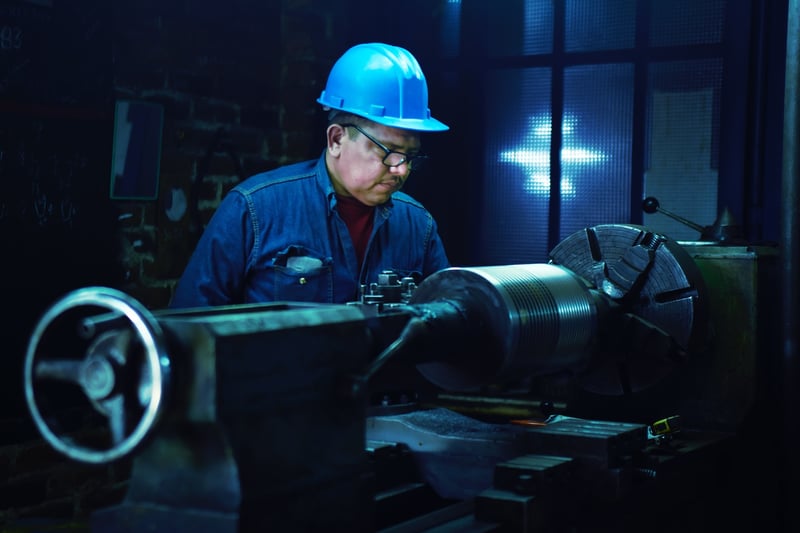In the ever-evolving manufacturing landscape, manufacturers constantly seek innovative solutions to enhance operations, optimize resource utilization, and gain a competitive edge. AI has emerged as a powerful tool to address these challenges, offering a range of transformative capabilities that are revolutionizing the industry. As we step into 2024, AI is poised to play an even more prominent role in shaping the future of manufacturing, addressing pressing pain points, and unlocking new frontiers of efficiency, agility, and sustainability.

Data-Driven Supply Chains
Supply chains in 2023 continued to improve since the COVID-19 pandemic, experiencing smoother operations with less congestion and a more balanced supply/demand environment. However, global supply chains entering 2024 are roiled by disruptions at two of the world’s crucial trade corridors — the Panama Canal and the Suez Canal — even as geopolitical tensions appear set to take a more prominent role in sourcing and distribution.
While AI cannot prevent supply chain disruptions, if deployed in the correct manner, it could provide predictive probabilities of future disruptions and give real-time insights into demand, inventory levels, and optimal distribution routes. Today, 37% of supply chain organizations already see the benefits of AI solutions; whether you win or lose in the market may soon depend on having the best Generative AI tools and the data quality to match them.
For instance, AI can analyze historical sales data, seasonality, store locations, and online/offline events to forecast demand fluctuations accurately. This predictive forecasting helps manufacturers adjust production schedules, optimize stock levels across locations, and improve fulfillment SLAs. Manufacturers can also leverage those data-driven approaches to answer strategic questions on coverage and competitive positioning and optimize yard management efficiency.
Smart Manufacturing
Smart manufacturing is revolutionizing all aspects of the manufacturing process, from design to production to delivery, using increasingly more digital technologies such as AI and IoT. Smart factories are equipped with sensors and connected devices that collect vast amounts of data on their production lines, equipment, process parameters, and outputs.
Companies that successfully implement smart manufacturing technologies have already seen a 30% to 50% reduction in machine downtime and a 15% to 30% improvement in labor productivity. While it’s still early days for Generative AI, manufacturing companies already see returns when using AI, and it is likely that best-in-class companies will go all-in on their AI investments in 2024. Indeed, a survey shows that for the manufacturing function of companies, costs decrease by 55%, and revenue increases by 66% when adopting AI.
For example, AI-powered predictive maintenance can benefit from maintenance history to detect early signs of equipment degradation, enabling proactive interventions before failures occur. This preventive approach reduces downtime, extends equipment lifespan, and minimizes costly repairs. Additionally, AI can help analyze historical production data to find the most impacting production parameters and, at the same time, enhance data-driven work by identifying trends among a large volume of sensors to understand root cause of failures.
Then, process and production engineers can assess the quality of upcoming production events by analyzing historical and real-time data, enabling them to anticipate and address production quality issues before they occur. Moreover, Generative AI can improve workers' efficiency by reducing the time spent searching for safety procedures and process guidelines, allowing them to focus on high-performance tasks.
Personalized Products and Services
According to a recent McKinsey survey, marketing and sales, product and service development, and service operations are the most commonly reported business functions using AI. It is unsurprising as AI can enable companies to offer hyper-personalized products and services to their customers, enhancing customer satisfaction and brand loyalty. In 2024, manufacturing companies will continue to expect changes in demand, market maturity, and pricing pressures; customers will gravitate toward businesses that can support them with aftermarket services, and the leading companies will use AI to detect asset problems faster and reduce downtime.
For example, product recommendation systems can push the right product to the right consumer by building a recommendation system using collaborative filtering and machine learning. Thanks to AI, manufacturers can segment customer data depending on their purchasing behavior, and they can also predict the future value of their customers to help them optimize their marketing efforts to increase revenues over time. AI-powered customer support chatbots can provide real-time assistance, answering customer queries and addressing concerns efficiently. Generative AI can also help generate new sales lead opportunities, leveraging internal and external knowledge.
AI for Sustainability
As demand for industrial products continues to rise, the manufacturing industry is facing a critical challenge related to its environmental impact. Indeed, the industry sector in 2022 was directly responsible for emitting 9.0 Gt of carbon dioxide (CO2), accounting for a quarter of global energy system CO2 emissions. Annual emissions slightly declined in 2020 and 2022 but did not align with the Net Zero Emissions by 2050 scenario.
As 2023 was the hottest year on record and 2024 could be even warmer, there is an urgent need to accelerate progress in energy efficiency, transition quickly to low-carbon fuels, and develop and deploy near zero-emission production processes faster. For instance, AI-powered applications could help track electricity consumption & CO2 emissions across the company’s manufacturing sites and help them minimize energy consumption.
To become a sustainable business, manufacturing companies will also need to positively affect the community, society, and economy. AI can help manufacturers improve supply chain transparency, enable them to design and produce sustainable products, and ensure that their workers get home safe.
Conclusion
AI is transforming the manufacturing industry, enabling manufacturers to optimize operations, enhance sustainability, and personalize products and services. By embracing and leveraging analytics and AI, manufacturers can gain a competitive edge and shape the future of manufacturing towards a more data-driven, sustainable, and personalized era.




